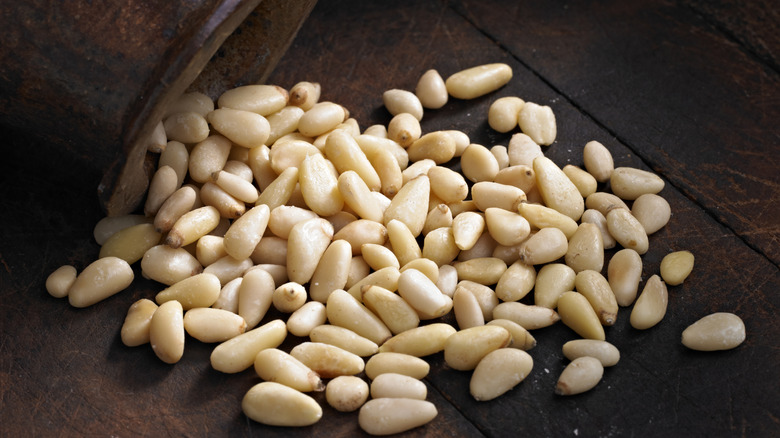What Is Pine Mouth And How Long Does It Last?
If you think the worst havoc a pinecone could wreak is simply tripping you up on the sidewalk, think again. These woody plants are the source of pine nuts, which are edible seeds used in recipes like traditional pesto or even as a topping for soup. We won't deny that they make a rich, slightly sweet addition to dishes, but that flavor sometimes comes with a price. That would be pine mouth.
Typically occurring one to three days after the consumption of pine nuts, pine mouth (also known as pine nut syndrome) is a condition that leaves some people with a bitter or metallic taste on their tongue. There are no known triggers for this disturbance other than the fact that it can unexpectedly happen to seemingly anyone who eats the raw variety of these seeds. You could have unknowingly eaten raw pine nuts in your store-bought hummus for years without issue, then suddenly find yourself affected by this bothersome phenomenon one day. Unpleasant as it is, this problem is thankfully temporary and usually only lasts anywhere from a few days to two weeks before your normal palate returns.
What to do if you contract pine mouth
It's a good thing pine mouth is relatively short-lived, as there's nothing you can do to remedy the condition once you're hit with it. It eventually disappears on its own, though there's currently no known way to hasten the process. Even stopping yourself from further consumption of pine nuts for the time being isn't proven to help, since this syndrome doesn't target specific people, nor does it seem to happen each time someone ingests these seeds. It certainly is recommended to put off eating pine nuts for a bit, but there's ultimately no need to avoid them for life.
However, you may still wish to consider switching over to slightly less risky ingredients. You won't have to worry about randomly falling victim to nuts like walnuts or cashews, for example. There are plenty of pine nut alternatives out there, from pistachios and almonds to Brazil nuts and macadamia nuts. Each kind has its own health benefits and flavor profile, meaning you can choose the one that best suits the dish you're whipping up. Heck, you can even avoid nuts altogether if you truly wanted to. After all, Rachael Ray proved it possible with her nut-free pesto recipe that uses capers as the star of the show.

